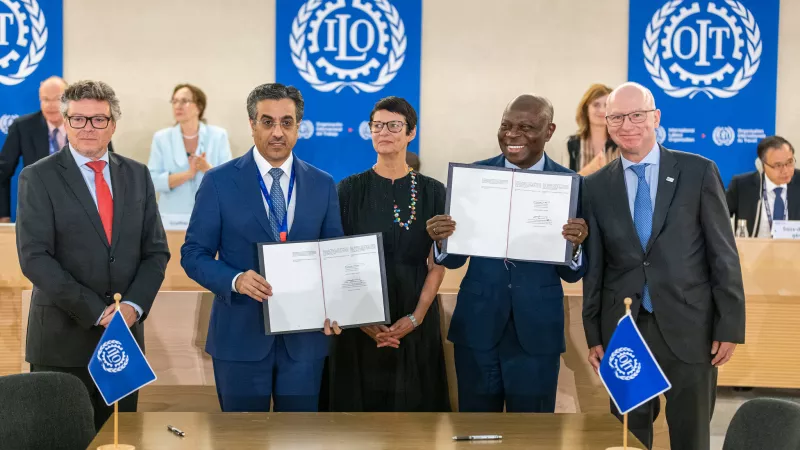
Apprenticeships
Quality apprenticeships based on a robust regulatory framework and social dialogue can contribute to lowering youth unemployment rates, reducing skills mismatch and enhancing the productivity and competitiveness of enterprises. Historically, apprenticeships have been considered primarily as a means of facilitating the school-to-work transition for young people. However, in the context of a fast-changing world of work, the apprenticeship model is empowering both youth and older workers to acquire new skills, reskill and upskill throughout their working lives.
A new Recommendation on Quality Apprenticeships was adopted during the 111th International Labour Conference. It is designed to support "opportunities for people of all ages to skill, reskill and upskill continuously" in rapidly changing labour markets.
Key features of the Recommendation:
- Social dialogue: employers and workers’ organizations play a key role
- Regulatory framework: well-designed regulations ensure quality
- Rights and protection: apprentices are entitled to rights and protection
- Equality and diversity: apprenticeships framework need to promote equality, diversity and social inclusion
Highlighted events

4 December 2024
Webinar series on Apprenticeships for a Brighter Future

Join a series of webinars exploring challenges, effective practices & innovative approaches to develop quality apprenticeship systems and programmes for a better future of work
News and articles

Advanced training programme in solar energy
ILO and FYCCI launch advanced solar energy training programme to empower technicians and strengthen Yemen's renewable energy sector

Unlocking Opportunities: Empowering Youth and Women in Yemen
Key resources

Quality Apprenticeships Recommendation


Plan of action for the implementation of the Quality Apprenticeships Recommendation


The ILO strategy on skills and lifelong learning 2030


Global lessons from innovative apprenticeships

Publications
Policy Brief
Recommendation No. 208 on Quality Apprenticeships: What Role for Trade Unions?
Skills development
Skills Matter!
Policy brief
Strengthening apprenticeships for transitions to formality
Upgrading apprenticeship systems in the informal economy
Millions of young people in the developing world acquire skills through apprenticeships in the informal economy and in many countries, greatly outnumber youth acquiring skills through formal technical and vocational education and training. A new ILO labour standard on quality apprenticeships has focused attention on the need to upgrade training and learning to strengthen apprenticeships in the informal economy.
Multimedia

Podcast
How can we close the skills gap? Quality apprenticeships and the future of work

Listen to this podcast on quality apprenticeships featuring Martin Henry, Research, Policy and Advocacy Coordinator of Education International, and Kathryn Rowan, Executive Director of GAN, the Global Apprenticeship Network.

Video
Quality apprenticeships and the future of work

Quality apprenticeships are proven to: Improve employability of apprentices; boost productivity; and, tackle skills mismatches.
Projects

Project
Apprenticeships Development for Universal Lifelong Learning and Training (ADULT)

Global Skills Programme
Contact us
Related topic

Skills and Lifelong Learning